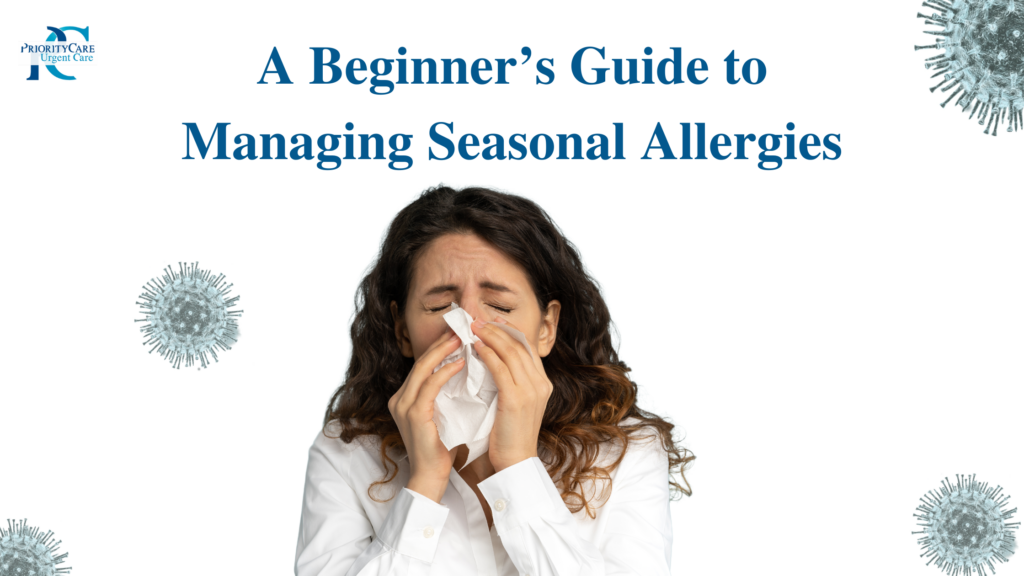
Seasonal allergies, also known as hay fever or allergic rhinitis, affect millions of people every year. As the seasons change, allergens like pollen, mold, and dust can trigger uncomfortable symptoms, making it difficult to enjoy daily activities. Understanding how to manage seasonal allergies effectively can help you minimize their impact and improve your overall well-being.
Understanding Seasonal Allergies: Triggers and Symptoms
Common Triggers of Seasonal Allergies
Seasonal allergies are caused by airborne allergens that become more prevalent during specific times of the year. Some of the most common triggers include:
- Pollen: Trees, grass, and weeds release pollen into the air, especially during spring and fall.
- Mold Spores: Mold thrives in damp environments and spreads through airborne spores, particularly in autumn and humid conditions.
- Dust Mites: While present year-round, dust mites can become more problematic when ventilation systems circulate them indoors.
- Pet Dander: Shedding from household pets can trigger allergic reactions in sensitive individuals.
Symptoms of Seasonal Allergies
If you suffer from seasonal allergies, you may experience symptoms such as:
- Sneezing and nasal congestion
- Itchy or watery eyes
- Runny nose and postnasal drip
- Coughing and throat irritation
- Fatigue due to poor sleep caused by congestion
While these symptoms are usually manageable at home, severe reactions may require medical attention.
When to Seek Urgent Care for Allergies
Signs That Indicate You Need Medical Attention
Most seasonal allergy symptoms can be managed with over-the-counter medications and lifestyle changes. However, certain cases may require urgent care. Seek immediate medical help if you experience:
- Severe breathing difficulties: If your allergies lead to wheezing or shortness of breath, it could indicate an asthma attack or anaphylaxis.
- Persistent sinus infections: Prolonged allergy symptoms can cause bacterial infections, leading to sinus pressure, headaches, and fever.
- Swelling of the throat or tongue: This could be a sign of a serious allergic reaction requiring immediate medical intervention.
- Severe eye irritation: If your eyes become excessively red, swollen, or painful, it might indicate an allergic conjunctivitis infection.
Managing Seasonal Allergies at Home
Effective Home Remedies and Lifestyle Adjustments
While medical treatments are essential, incorporating simple lifestyle changes can help reduce exposure to allergens and alleviate symptoms. Consider these strategies:
- Monitor Pollen Counts: Check daily pollen forecasts and limit outdoor activities when levels are high.
- Keep Windows Closed: Prevent allergens from entering your home by using air conditioning instead of opening windows.
- Use HEPA Filters: Air purifiers with HEPA filters can help remove allergens from indoor air.
- Shower After Outdoor Activities: Rinsing off pollen and allergens from your skin and hair can prevent irritation.
- Wash Bedding Frequently: Use hot water to eliminate dust mites and pollen buildup on sheets and pillowcases.
- Wear Sunglasses and Hats: This protective gear can help shield your eyes and hair from airborne allergens when outdoors.
By implementing these preventive measures, you can significantly reduce your allergy symptoms and enjoy seasonal changes more comfortably.
The Role of Flu Shots in Allergy Management
How Flu Shots Can Help Allergy Sufferers
Flu season often overlaps with peak allergy seasons, making it harder to distinguish between flu symptoms and allergic reactions. Getting a flu shot at PCC can help prevent complications caused by coexisting flu and allergy symptoms. Benefits of flu vaccination include:
- Reduced Risk of Severe Illness: Flu shots protect against common influenza strains, lowering the chances of hospitalization.
- Less Confusion Between Flu and Allergies: Avoid misdiagnosing flu symptoms as seasonal allergies by staying vaccinated.
- Stronger Immune System: Preventative measures like vaccinations can help your body focus on managing allergies rather than fighting off infections.
Conclusion
Managing seasonal allergies doesn’t have to be a challenge. By understanding common triggers, recognizing when urgent care is needed, and using a combination of medical treatments and home remedies, you can keep symptoms under control. Priority Care Clinics offers top-tier allergy management solutions, ensuring you receive the best possible care. Whether you need urgent relief or long-term prevention, our team is here to help you breathe easier and enjoy every season without discomfort.



